What does SEO stand for?
The term SEO is becoming more and more popular, but the concept it is still misunderstood by many.
What does SEO stand for?
SEO stands for Search Engine Optimisation.
”SEO is the process of gaining higher visibility in search results in order to win more quality traffic to your website”.
If after the definition, you are still hungry of knowledge about SEO, please read on, as in this article I’ll cover different points:
Happy reading!
1.What SEO is not?
In the early days of Search Engines, when the algorithms where not as evolved they are now, adding some meta keywords and buying links from low quality sites, could enable you to rank relatively quickly. Those days are over, and as the algorithms become more cleaver only the best results will rank on the first positions. These origins have created a halo of mystery and misconception around SEO. Let’s clarify what SEO is not:
- SEO is not a magic trick that makes your website rank on the very top position of the Search Engines, for chosen search queries. Moreover, it doesn’t happen overnight. Instead, SEO requires a lot of work and takes time. How long, depends. A recent study performed by “Ahrefs” revealed that from 2 million pages analysed, only 5.7% ranked on page 1 within 1 year for at least 1 keyword. These results show the difficulty implied in SEO.
- No SEO can’t guarantee you position 1 in search results. Even with the best SEO strategy and tactics, there are many factors that are not in our hands and that influence your website ranking:
- Changes in user behaviour
- Algorithms improvements
- Actions made by Competitors
- New Content indexed
- Internal changes inside your organisation
- Evolution of the Marketplace
- SEO is not paid. When we perform the search “take away Dublin”, the first results that appear are paid results. At present, Google has reserved up to 4 top spaces for paid search results. All of these have the symbol “ad” on the second line. Those businesses are paying in order to appear right in front of their target market.

Immediatly after the paid results, the non-paid results appears. These are the positions that we are targeting with SEO our strategies.
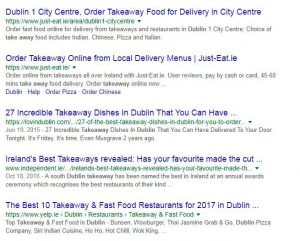
The following job posts on different freelancer sites have been posted recently and all of them have some of the mentioned misconceptions.
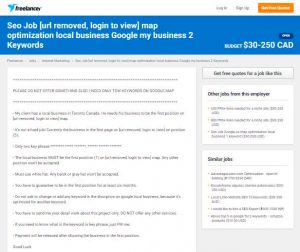


2.How Search Engines work?
To be able to understand SEO, we also need to understand Search Engines.
“A Search Engine is a program, which crawls the World Wide Web using the best path available (links), then indexes the results in order to provide users with a ranked list of the pages they’ve determined are the most relevant, when performing a search.”
From this point forward I will focus on Google, as it is the most popular Search Engine, even though there are many other Search Engines out there.
Search Engine Market Share Worldwide
 Search Market Share in Ireland
Search Market Share in Ireland
How Google works?
Basically a Search Engine crawls, indexes and then returns the most relevant results.
Crawl
In order to reach the huge amount of existing and new pages, Google uses automated crawlers (Google bots), which follow links from one page to another.
Once the crawler visit a web page it looks for changes. If your website updates the content frequently, as for example in the case of a news websites, the bots will come back recurrently. If the website is static, where the content is barely changing or changing infrequently, the website will be crawled less often.
Index
The crawler copies the page content, analyses the content to determine what the page is about, then catalogues them by their index, containing all the possible search terms. Extremely large databases are used for this purpose.
Return Results
When we perform a search query we don’t search on the live World Wide Web, we search on the latest Google cached version. This means that the results offered will only be from pages that has previously been crawled and indexed.
After receiving the search query, the results are returned in fractions of seconds, sorted by relevance and popularity. In order to do this, the engines employ mathematical equations (algorithms) that use more than 200 factors to organize the web pages.
In addition, other personalised information is used (your previous searches, your location, your language or the type of device you’re using) to give you the most relevant results. So the results that you will receive may be different than the results that appear to another person. For example, if a previous search of mine was related to cars, and then straightaway I search for “jaguar”, I will probably get results related to the car, but someone else may have results related to the animal.
Thanks to the possibility to index and archive pages, The Wayback Machine was born. The Wayback Machine is a digital archive of the World Wide Web that allow us to view the appearance of a website in a past moment in time. In the picture bellow, we can see how Google looked on 2nd of December 1998.

3.What is SEO?
Now that we know what does SEO stand for, what SEO is not and how Search Engines work, let’s dig deeper into what exactly it is SEO.
As mentioned before, SEO is the process of maximising visibility in the search results to win more traffic. In this process, many factors are taken into account but the three main points are content, links and rank brain as revealed the past March 2016 by Andrey Lipattsev, Search Quality Senior Strategist at Google.
So SEO requires creating and spreading successful content. It implies wining links from other quality websites. Those links needs to be achieved in the most natural way possible, meaning not achieving links by paying or in exchange of anything. And the most important, SEO’s number one priority is fulfilling the user’s intent. By incorporating artificial intelligence to its algorithms, Google have exponentially increased its understanding of our search queries day by day. For example, this intelligence is enabling Google to answer questions related to previous results.
Question: Who is the president of Ireland?
Answer: Michael D. Higgins
Question: How tall is he?
Answer: 1.63m
Search Engines not only understand the natural flow of language, but they also are able to analyse if users are happy with the served results, after they visit them. For this reason, user experience is also a very important element in SEO.
SEO also ensures that your website has the correct structure and technical requirements in order to be crawled and indexed by search engines. As we’ve seen before, only pages that have been crawled and indexed will appear in the search results.
4.Present and Future of SEO
While many companies still believe that SEO will rank your website in the number one position overnight, the future is already here: Artificial intelligence (AI), voice search, accelerated mobile pages (AMP), progressive web apps (PWA), mobile first and personal assistants to name but a few.
How are those changes affecting SEO? Google’s main goal was, it and will be to return the best solution to your search, so as SEO professionals we always need to keep this in mind. Keeping this in mind, some key points in 2017 are:
- As voice search takes over, we are able to use more natural language. This means that we can use longer sentences, shifting the attention towards answering user’s questions, rather than just choosing pure keywords.
- Speed is a key element. Google offers a new test, where you see how many users you’re losing due to the time it takes to load your site.
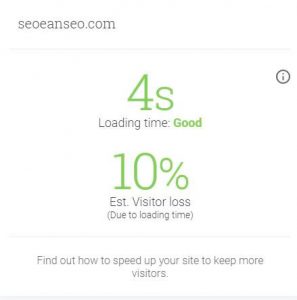
- Having a mobile friendly website is a must.

- As Google tries to answer users’ queries as fast and accurately as possible, structure data mark-up becomes essential. Structured data mark-up makes it easier for search engines to understand the content. Some examples of structure data mark-up are Schema, Open Graph or Twitter Cards. Some relevant sources regarding structured data mark-up are:
- Reduce the use of pop-ups that are invasive and make it difficult to navigate the site. Rand Fishkin has a whiteboard Friday with a more in depth explanation.
- Giving a more personalised information makes local results, and in consequently local SEO highly important. Some of the key elements that help Local SEO are:
We need to keep updated and in advance of what’s coming next (the Internet of Things, Brain computer interface, image recognition , etc.).
I hope that after this reading I have clarified not only what SEO stand for, but have also provided a quick overview of what SEO is. In conclusion, Search Engine Optimisation requires hard work in order to compete with the rest of the content out there, keeping always in mind the user’s intend.

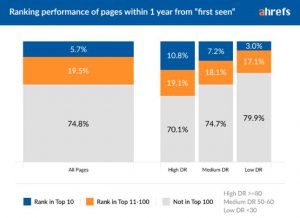
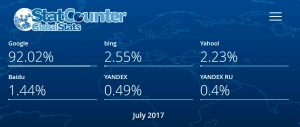
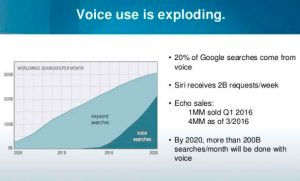

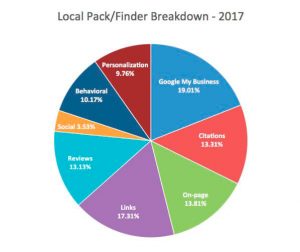
Leave a Reply